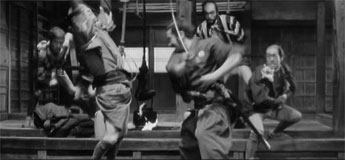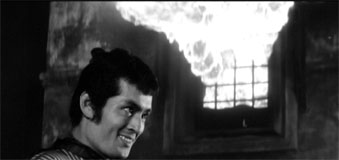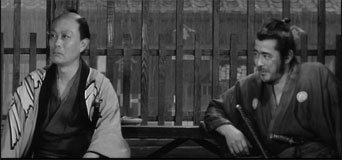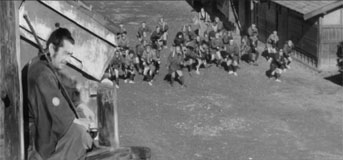Yojimbo
(Akira Kurosawa) 1961
 Set
in 1860, Akira Kurosawa’s Yojimbo opens with a title card that tells us
the emergence of a middle class has taken the upper class out of power. Unlike
opening titles in most period movies, this information is no mere background
detail. It’s closer to a mission statement. Yojimbo is a
purposely-inflated satiric comedy that takes to task the capitalist motives that
sprang up with emergence of a middle class in Japan. Since he’s skewering
capitalism, which is a generally thought of as a Western phenomena, Kurosawa
stylistically echoes several Western genres (most notably the western and the
gangster film), in this samurai epic. Another title card tells us that Sanjuro
(Toshiro Mifune), his recently unemployed hero, has nothing but his sword and
his wits to protect him. He stumbles into the microcosmic hamlet that provides
the setting of the entire film penniless, but quickly begins to improve his
fortunes once he sizes up the transparent situation before him. His success
basically argues that it’s only the cleverest and most devious that will
thrive in such a flawed system.
Set
in 1860, Akira Kurosawa’s Yojimbo opens with a title card that tells us
the emergence of a middle class has taken the upper class out of power. Unlike
opening titles in most period movies, this information is no mere background
detail. It’s closer to a mission statement. Yojimbo is a
purposely-inflated satiric comedy that takes to task the capitalist motives that
sprang up with emergence of a middle class in Japan. Since he’s skewering
capitalism, which is a generally thought of as a Western phenomena, Kurosawa
stylistically echoes several Western genres (most notably the western and the
gangster film), in this samurai epic. Another title card tells us that Sanjuro
(Toshiro Mifune), his recently unemployed hero, has nothing but his sword and
his wits to protect him. He stumbles into the microcosmic hamlet that provides
the setting of the entire film penniless, but quickly begins to improve his
fortunes once he sizes up the transparent situation before him. His success
basically argues that it’s only the cleverest and most devious that will
thrive in such a flawed system.
 In
Yojimbo, two warring clans of thugs are fighting for control of the
gambling trade, and each of them is eager to recruit Sanjuro’s services as a
samurai so that they might gain the upper hand in their impending clash.
When Sanjuro resorts to two-timing treachery, playing one side’s
capitalist opportunism against the other, the movie wants us to cheer, since it
seems to confirm Kurosawa’s obvious stance that the middle class, and
capitalist concerns that occupy them, are rather senseless. The gang leaders’
self-destructive unwillingness to cooperate with each other is born out of their
desire to control the limited resources of the village. Instead of working
together to increase the village’s overall wealth, they squabble over it,
resulting in its destruction. Mifune’s samurai turns that hubris against them,
and the biggest joke of all seems to be that so much death and destruction is
wrought over such meager wealth. These men have enough power to command respect
from lowlifes and felons, but they aren’t nearly powerful enough to impact any
real social change. When a government official shows up, they push their agendas
aside so that they may compete in groveling and bribing. Kurosawa, never one to
be particularly subtle, sets the tone early on by having Sanjuro see a dog
running by with a human hand in its mouth as he enters the village. Nearly
everyone in the village is equated with that dog here, and they all are fighting
over table scraps.
In
Yojimbo, two warring clans of thugs are fighting for control of the
gambling trade, and each of them is eager to recruit Sanjuro’s services as a
samurai so that they might gain the upper hand in their impending clash.
When Sanjuro resorts to two-timing treachery, playing one side’s
capitalist opportunism against the other, the movie wants us to cheer, since it
seems to confirm Kurosawa’s obvious stance that the middle class, and
capitalist concerns that occupy them, are rather senseless. The gang leaders’
self-destructive unwillingness to cooperate with each other is born out of their
desire to control the limited resources of the village. Instead of working
together to increase the village’s overall wealth, they squabble over it,
resulting in its destruction. Mifune’s samurai turns that hubris against them,
and the biggest joke of all seems to be that so much death and destruction is
wrought over such meager wealth. These men have enough power to command respect
from lowlifes and felons, but they aren’t nearly powerful enough to impact any
real social change. When a government official shows up, they push their agendas
aside so that they may compete in groveling and bribing. Kurosawa, never one to
be particularly subtle, sets the tone early on by having Sanjuro see a dog
running by with a human hand in its mouth as he enters the village. Nearly
everyone in the village is equated with that dog here, and they all are fighting
over table scraps.
 It’s
odd that Kurosawa should have a reputation as a great humanist, since his films
often show us a rather cynical worldview. Ultimately, this movie seems to argue
that the poor and rich shouldn’t mingle. Besides Sanjuro, his greatest
sympathies here seem to lie with the lowest class inhabitants in the town, who
mostly stay shuttered up in their homes while they wait for the middle class to
off themselves with Sanjuro’s help. As weary as they seem with the state of
affairs, they seem to have grown fairly adept at navigating it. When the
vigilante Sanjuro implies that his killing is justified since he’s outsmarted
the criminal riffraff, he’s dispensing a skewed morality. No one designates
him as the purveyor of justice here, but he assumes the mantle anyway, and
becomes judge, jury, and executioner. He manipulates and lies to his prospective
employers to turn them against each other, but you can’t shake the feeling
that Kurosawa sees him as something greater than the commodity that the geisha
girls are. The satiric power of the movie suffers whenever it creates a hallowed
place for his character and places his accountability outside of the same realm
as everyone else’s. Just because Sanjuro is a self-aware product doesn’t
mean that he isn’t still a product. It just so happens that on this occasion
he opts to
get paid in goodwill over gold. It seems odd that he never seems to
notice that his attempts at compassion backfire, time and again.
It’s
odd that Kurosawa should have a reputation as a great humanist, since his films
often show us a rather cynical worldview. Ultimately, this movie seems to argue
that the poor and rich shouldn’t mingle. Besides Sanjuro, his greatest
sympathies here seem to lie with the lowest class inhabitants in the town, who
mostly stay shuttered up in their homes while they wait for the middle class to
off themselves with Sanjuro’s help. As weary as they seem with the state of
affairs, they seem to have grown fairly adept at navigating it. When the
vigilante Sanjuro implies that his killing is justified since he’s outsmarted
the criminal riffraff, he’s dispensing a skewed morality. No one designates
him as the purveyor of justice here, but he assumes the mantle anyway, and
becomes judge, jury, and executioner. He manipulates and lies to his prospective
employers to turn them against each other, but you can’t shake the feeling
that Kurosawa sees him as something greater than the commodity that the geisha
girls are. The satiric power of the movie suffers whenever it creates a hallowed
place for his character and places his accountability outside of the same realm
as everyone else’s. Just because Sanjuro is a self-aware product doesn’t
mean that he isn’t still a product. It just so happens that on this occasion
he opts to
get paid in goodwill over gold. It seems odd that he never seems to
notice that his attempts at compassion backfire, time and again.
 Sanjuro
just sits on his perch, above the common folk, and watches as they tear each
other apart, and that standoffish point of view seems reflective of Kurosawa’s
worldview. As a result, some of the observation that the film doles out seems
rather schematic. In Seven Samurai, he similarly filtered varying points
of view through his large cast, but it never felt calculated like it does here.
The audience is placed in the same position as Sanjuro, and can similarly watch
the gears turning behind the scenes, but I’m not entirely sure that this
effect is intentional. It’s fortunate that this material wasn’t intended as
a drama, since it’s a bit thin and obvious, though you worry sometimes that
the director intends to play the scenes with a straight face. If that’s the
case, Kurosawa seems downright contemptuous of humanity if this brand of heroism
is the best he can scrounge up. The film’s direction seems to coast by more on
virtuosity than necessary technique at times, though Kurosawa’s bloody
showmanship often mocks the inflated sense of purpose that floats around in the
film’s most dramatic moments. Still, there’s no denying its snappiness.
Whenever you shut your brain off, it hums amicably right along.
Sanjuro
just sits on his perch, above the common folk, and watches as they tear each
other apart, and that standoffish point of view seems reflective of Kurosawa’s
worldview. As a result, some of the observation that the film doles out seems
rather schematic. In Seven Samurai, he similarly filtered varying points
of view through his large cast, but it never felt calculated like it does here.
The audience is placed in the same position as Sanjuro, and can similarly watch
the gears turning behind the scenes, but I’m not entirely sure that this
effect is intentional. It’s fortunate that this material wasn’t intended as
a drama, since it’s a bit thin and obvious, though you worry sometimes that
the director intends to play the scenes with a straight face. If that’s the
case, Kurosawa seems downright contemptuous of humanity if this brand of heroism
is the best he can scrounge up. The film’s direction seems to coast by more on
virtuosity than necessary technique at times, though Kurosawa’s bloody
showmanship often mocks the inflated sense of purpose that floats around in the
film’s most dramatic moments. Still, there’s no denying its snappiness.
Whenever you shut your brain off, it hums amicably right along.
* * *
1/2
07-21-02
Jeremy Heilman